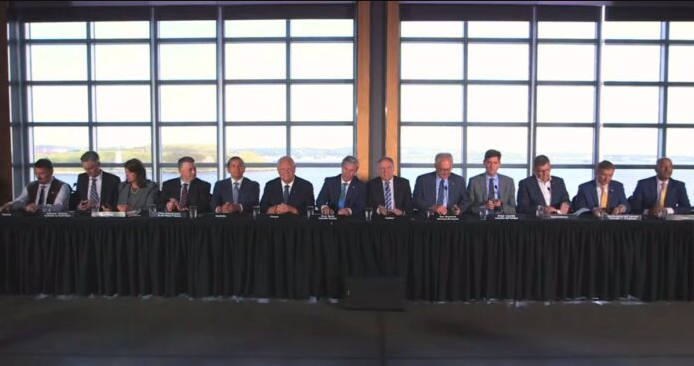Why go through all the bother to create a podcast?
What problem are you trying to address?
What answers are you trying to find?
The short video and essay offer answers below. (Different content in each)
Warning: some of the episodes get deep into political theory. We need to go beyond what retail media can sell, if we hope to understand our times. As Hamlet said,
There are more things in heaven and earth, Horatio, than are dreamt of in your philosophy.
Here’s the essay from my Substack – please like and share!
Times always change, but our time is changing faster than usual. We live in a rare moment of revolution — a paradigm shift in culture, politics, economics … everything. As Ginny Roth said in episode #3, “Nothing is settled.”
Since World War II, western countries have held a shared set of principles — a common operating system, if you will. Most people call it ‘liberal democracy’. It includes a long list of assumptions about freedom, the individual, rule of law, deference to reason and evidence, trust in science, respect for experts, and much more.
Those ideas are no longer assumed or shared. Many academics abandoned them long before I was born, but regular people never doubted them until recently. The 2008 financial crisis shook many people’s faith in liberal principles, but we hoped it was a blip, a black-swan event.
In hindsight, 2008 was one car on an accelerating train. Trump’s ride down the escalator in 2015, Brexit in June 2016, and then Trump’s first victory in November 2016 are all connected. Even so, diehards refused to doubt their faith in liberal first principles, while the train kept gaining speed.
In late 2019-early 2020, China welded doors shut on apartment buildings to contain a novel infection. Western countries soon declared a state of emergency for a new SARS virus. Borders closed. Police arrested families out walking in the park. By the summer, we had George Floyd, Black Lives Matters, Capital Hill Autonomous Zone in Seattle, and more.
Canada’ s Freedom Convoy in 2022 sparked similar events around the world. Prime Minister Trudeau’s Emergency Measures’ Act solidified his notoriety with citizens’ bank accounts frozen for donating $50, mounted policed trampling a disabled woman, and more.
All due to COVID, right?
But the train hasn’t slowed. Today, 98% of academic job postings discriminate based on DEI criteria. America has started to abandon identity-based employment discrimination, but Canada remains committed. Doctors must not question a teenager’s gender dysphoria to avoid breaking new law that bans ‘conversion therapy.’ Medical Assistance in Dying is now the 5th leading cause of death in Canada, in which most patients choose voluntary euthanasia with only a few choosing physician-assisted suicide.
It goes on with the Russia-Ukraine war. Hamas attacked a music event killing and kidnapping the old and very young. Canadian citizens celebrate Hamas with parties in the street. Students shut down universities in solidarity.
This long list is too short, of course. In isolation, each event might elicit a proper, liberal explanation. Citizens misunderstand freedom. Prime Minister Trudeau needs lessons on parliamentary democracy. Students mistake their own privilege. Conflict in the middle east would stop if we abandoned tribalism and historical grievances. Faith in the western liberal order need not waver. Except it does, and it should.
Leave aside the long list of events. The Israel-Hamas war by itself forces us to question our principled support for pluralism (see Sean Speer in episode #5). Given a decade of remarkable events, October 7 demands we reassess our assumptions about western liberal democracy.
Do our core assumptions still hold?
In a way, our revolutionary moment makes up for the unique, relative stability of the post-WWII liberal era. We are returning to a state more typical of modern human history: one that involves continual contest interspersed with moments of social order rarely enduring long enough to be taken for granted.
Revolutions awaken a search for ways to speak about things that most people already know to be true. Since the start of human history, children grow up, gain skills, develop interests, find mates, build homes, and raise families. This only sounds radical to modern, liberal minds — a tiny minority in human history.
Most Conservative parties and spokespeople have been, until now, essentially liberals (as many guests have noted on this show). But Conservative parties are changing. ‘Conservative’ political theory is shifting away from the basically liberal framework shared by other political parties. It is rediscovering a new conservatism (or a new, new-conservatism).
Roger Scruton, the late British philosopher, called conservatism a “work of rescue.” Many writers have noted how conservative ideas revive in times of crisis. People grow tired of a world that makes their heads spin. They abandon simple, ‘self-evident’ ideologies in favour of simple living. Regular people hunt for old habits and ideas that they can use to improve modern life. They rediscover meaning in a quest for a truly good life — a life well lived — instead of the limitless frenzy of late-stage liberalism.
Conservatism has no holy book. It has no prophet — no Oracle at Delphi. Instead it offers a messy library of trial and error.
Just to be clear, liberty predates liberalism by more than a thousand years. The rule of law, trial by jury, habeas corpus, private property, stable government and all the other key features of western civilization came about centuries before liberalism. Several thousand years of failures help us identify rare success. Things that work well almost never come de novo by genius and invention. The best ideas often appear to come by chance, after centuries of failure.
I created this podcast to tackle the massive shift we are experiencing in political theory, public policy, and modern culture. My starting hypothesis is that conservatism and liberalism are not the same thing. I hope to rediscover the differences between conservatism and liberalism in politics, culture, education, philosophy, economics, religion, history, and more. I think it holds the answer to a better life. I hope you will join me in the search!



